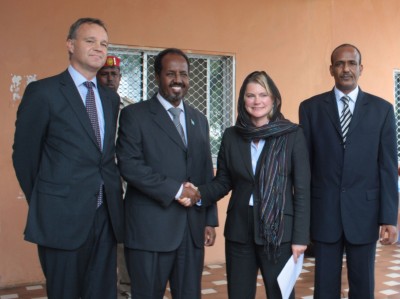
So the final piece of the post-Transition jigsaw has finally fallen into place. Prime Minister Abdi Farah Shirdon’s 10-person Council of Minister is now approved – overwhelmingly – by Parliament and with it, the final act of a two-month process to find Somalia’s new leaders.
Put before Parliament last week, their near-unanimous approval of the nominated Council was a further sign that both the Parliament and the new Executive are both committed to forging a new path. The new Council of Ministers is a mixture of old faces and a few new ones; a mixture of political experience and expertise drawn from further afield.
It shows that this new leadership is both sensitive of their own identity and sees the need for a delicate balance of political constituencies. The new cabinet has a number of unique and welcome features, not least its size and the universally-welcomed appointment of two women to senior positions, including Deputy Prime Minister and Foreign Minister, and Social Services Development.
Like others, I have watched with considerable interest as the process has unfolded. I have been struck by a number of things.
Firstly, the time taken to get it right. This has been a lengthy process of negotiation and dialogue; an attempt to make sure that there is some balance of Somalia’s plethora of political interests in the appointments.
Secondly, the commitment to break with the past. A cabinet of only ten members is a brave and welcome innovation: giving greater focus to key priorities; and a greater sense of collective responsibility. And it is as a team that they should work.
Yet, I’m also aware that the challenges they face are daunting: a fragile set of institutions; a depleted and insufficient bureaucracy; where a significant proportion of Somalia’s human resources are outside the country; continued insecurity and instability; incentives that drive corruption and misappropriation. When set against the almost sky-high levels of expectations, the challenges are even more acute.
Tackling the continued threat posed by Al Shabaab remains key. Having lost Mogadishu, Baidoa and Kismayo in the past twelve months or so, Al Shabaab is down. They no longer hold as much territory or represent the same political force they once did. But it would be a mistake to count them out.
Insurgency-style tactics, from IEDs to suicide attacks, are evidence of Al Shabaab’s changing strategy, but also their increasing disregard for the safety and security that Somalis so passionately desire.
At the same time, it will be vital that the new government is able to show it can enable changes to ordinary people’s lives – making the streets safer for women and children, ensuring children are immunised against disease, getting girls into school, generating jobs for young people. None of this can be done without expanding safety, security and political leadership and reconciliation.
This inevitably means making sure AMISOM has the tools to do its job effectively, while Somalia takes ever-greater ownership of its own security: this means supporting the Somali National Security Forces; the Police; it also means strengthening the judiciary.
The President has, rightly, made this his top priority. At the same time, he has also said that it will be necessary in due course to engage all those who are alienated from the political process or marginalized politically.
Against these challenges, some say – surely this is a Council destined to fail? I don’t think so.
The President has told me he is adamant that the new government will reclaim Somalia’s sovereignty and that state will hold increasing legitimacy and credibility in the eyes of the Somali people. He and the Prime Minister are clear that it should be they who lead for the Somali people. But they also recognise that they cannot do this on their own.
The President has made it clear that he expects to see what he calls a ‘paradigm shift’ in how the international community and the Somali authorities engage with each other. At the heart of this are two constants – a long-term commitment and a more direct partnership with Somalia
It is with this spirit of commitment and partnership that the UK is now working with the new leadership. In the last few weeks, we have had a number of senior visitors to Mogadishu – most notably, the first visit by the new UK Development Secretary, Justine Greening MP and the new UK Minister for Africa, Mark Simmonds MP; but also the Head of the British Army, General Sir Peter Wall; and the UK’s Deputy National Security Adviser, Oliver Robbins.
During each visit we have listened to the President and the Speaker set out their priorities; we have seen first-hand the security challenges facing the Somali National Security Forces and AMISOM; we have heard how the judiciary and police need to be supported; and we have listened to the demand to combat corruption and strengthen the government’s management of its own financial resources.
As a result, we have already announced nearly £50 million of assistance designed to help Somalia’s new authorities.
So as the new cabinet settles in, the UK is clear that the opportunities afforded Somalia by the end of the Transition and her new political leadership should be seized. As President Hassan Sheikh Mohamud says, Somalia has already lost several generations and too much time.
While this next phase of Somalia’s transition to greater stability will be difficult for many Somalis, one thing is clear – the UK will be standing with them. Challenges remain, but by working in partnership and for the long-term, we’re determined to help Somalis overcome them.
